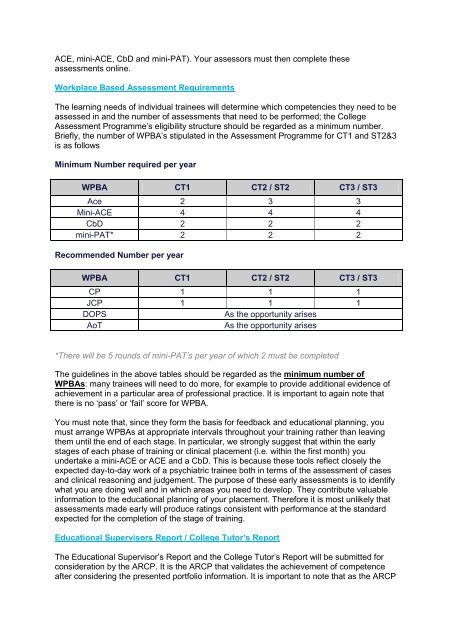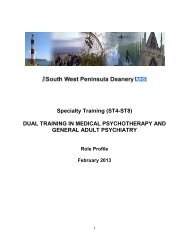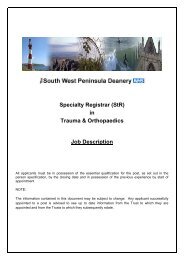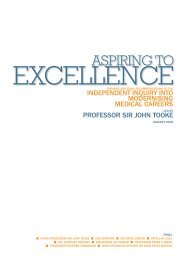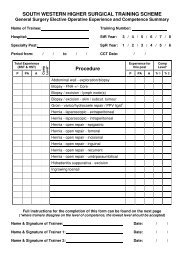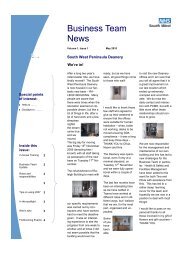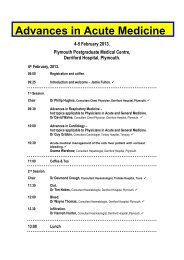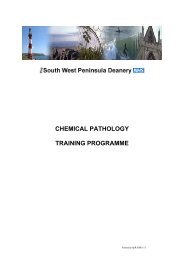A Guide to Core Psychiatry (CPT) Workplace Based Assessments ...
A Guide to Core Psychiatry (CPT) Workplace Based Assessments ...
A Guide to Core Psychiatry (CPT) Workplace Based Assessments ...
You also want an ePaper? Increase the reach of your titles
YUMPU automatically turns print PDFs into web optimized ePapers that Google loves.
ACE, mini-ACE, CbD and mini-PAT). Your assessors must then complete these<br />
assessments online.<br />
<strong>Workplace</strong> <strong>Based</strong> Assessment Requirements<br />
The learning needs of individual trainees will determine which competencies they need <strong>to</strong> be<br />
assessed in and the number of assessments that need <strong>to</strong> be performed; the College<br />
Assessment Programme’s eligibility structure should be regarded as a minimum number.<br />
Briefly, the number of WPBA’s stipulated in the Assessment Programme for CT1 and ST2&3<br />
is as follows<br />
Minimum Number required per year<br />
WPBA CT1 CT2 / ST2 CT3 / ST3<br />
Ace 2 3 3<br />
Mini-ACE 4 4 4<br />
CbD 2 2 2<br />
mini-PAT* 2 2 2<br />
Recommended Number per year<br />
WPBA CT1 CT2 / ST2 CT3 / ST3<br />
CP 1 1 1<br />
JCP 1 1 1<br />
DOPS<br />
As the opportunity arises<br />
AoT<br />
As the opportunity arises<br />
*There will be 5 rounds of mini-PAT’s per year of which 2 must be completed<br />
The guidelines in the above tables should be regarded as the minimum number of<br />
WPBAs: many trainees will need <strong>to</strong> do more, for example <strong>to</strong> provide additional evidence of<br />
achievement in a particular area of professional practice. It is important <strong>to</strong> again note that<br />
there is no ‘pass’ or ‘fail’ score for WPBA.<br />
You must note that, since they form the basis for feedback and educational planning, you<br />
must arrange WPBAs at appropriate intervals throughout your training rather than leaving<br />
them until the end of each stage. In particular, we strongly suggest that within the early<br />
stages of each phase of training or clinical placement (i.e. within the first month) you<br />
undertake a mini-ACE or ACE and a CbD. This is because these <strong>to</strong>ols reflect closely the<br />
expected day-<strong>to</strong>-day work of a psychiatric trainee both in terms of the assessment of cases<br />
and clinical reasoning and judgement. The purpose of these early assessments is <strong>to</strong> identify<br />
what you are doing well and in which areas you need <strong>to</strong> develop. They contribute valuable<br />
information <strong>to</strong> the educational planning of your placement. Therefore it is most unlikely that<br />
assessments made early will produce ratings consistent with performance at the standard<br />
expected for the completion of the stage of training.<br />
Educational Supervisors Report / College Tu<strong>to</strong>r’s Report<br />
The Educational Supervisor’s Report and the College Tu<strong>to</strong>r’s Report will be submitted for<br />
consideration by the ARCP. It is the ARCP that validates the achievement of competence<br />
after considering the presented portfolio information. It is important <strong>to</strong> note that as the ARCP


